The term rumba may refer to a variety of unrelated music styles. Originally, "rumba" was used as a synonym for "party" in northern Cuba, and by the late 19th century it was used to denote the complex of secular music styles known as Cuban rumba. Since the early 20th century the term has been used in different countries to refer to distinct styles of music and dance, most of which are only tangentially related to the original Cuban rumba, if at all. The vague etymological origin of the term rumba, as well as its interchangeable use with guaracha in settings such as bufo theatre, is largely responsible for such worldwide polysemy of the term. In addition, "rumba" was the primary marketing term for Cuban music in North America, as well as West and Central Africa, during much of the 20th century, before the rise of mambo, pachanga and salsa.

Congolese music is one of the most influential music forms of the African continent. Since the 1930s, Congolese musicians have had a huge impact on the African musical scene and elsewhere. Many contemporary genres of music, such as Kenyan Benga and Colombian Champeta, have been heavily influenced by Congolese music. In 2021, Congolese rumba joined other living traditions such as Jamaican reggae music and Cuban rumba on UNESCO's "intangible cultural heritage of humanity" list.

Kongo Central, formerly Bas-Congo, is one of the 26 provinces of the Democratic Republic of the Congo. Its capital is Matadi.

Soukous is a genre of dance music originating from the Democratic Republic of the Congo and the Republic of the Congo. It derived from Congolese rumba in the 1960s, with faster dance rhythms and bright, intricate guitar improvisation, and gained popularity in the 1980s in France. Although often used by journalists as a synonym for Congolese rumba, both the music and dance associated with soukous differ from more traditional rumba, especially in its higher tempo, song structures and longer dance sequences.
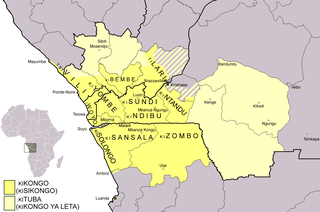
Kongo or Kikongo is one of the Bantu languages spoken by the Kongo people living in the Democratic Republic of the Congo (DRC), the Republic of the Congo, Gabon, and Angola. It is a tonal language. The vast majority of present-day speakers live in Africa. There are roughly seven million native speakers of Kongo in the above-named countries. An estimated five million more speakers use it as a second language.
Putumayo World Music is a New Orleans-based record label that specializes in compilations of world music, jazz and blues.

African popular music, can be defined as any African music, regardless of genre, that uses Western pop musical instruments, such as the guitar, piano, trumpet, etc. Afropop is a genre of music that combines elements from both African traditional music with Western pop music, characterized by the use of African rhythms and melodies, as well as western instrumentation and production techniques. Like African traditional music, Afropop is vast and varied. Most contemporary genres of western popular music build on cross-pollination with traditional African American and African popular music. Many genres in popular music of rock, metal, pop, blues, jazz, salsa, zouk, and rumba derive, of varying degrees, musical traditions from Africa cultured to the Americas, by enslaved Africans. These rhythms and sounds have subsequently been adapted by newer genres like hip-hop, and R&B. Likewise, African popular music have adopted Western music industry recording studio techniques. The term does not refer to a specific style or sound but is used as a general term for African popular music.

The culture of the Democratic Republic of the Congo is extremely varied, reflecting the great diversity and different customs which exist in the country. Congolese culture combines the influence of tradition to the region, but also combines influences from abroad which arrived during the era of colonization and continue to have a strong influence, without destroying the individuality of many tribal customs.
Kwassa kwassa is a dance created by Jeanora, a mechanic in Kinshasa from the Democratic Republic of the Congo, that started in the 1980s, where the hips move back and forth while the hands move to follow the hips. It was very popular in Africa.
Marie-Claire Mboyo Moseka, known professionally as M'bilia Bel, is a Congolese singer and songwriter. Dubbed the "Queen of African Rumba" and "Queen Cleopatra", she is regarded as one of the most influential figures in 20th-century Congolese and African popular music. Her music is a blend of traditional Congolese rumba, soukous, rap, and zouk, with lyrics that often delve into themes of love, politics, hedonism, militancy, jealousy, sentimentality, and education.
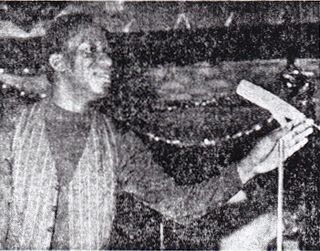
Pascal-Emmanuel Sinamoyi Tabu, better known as Tabu Ley Rochereau, was a leading African rumba singer-songwriter from the Democratic Republic of the Congo. He was the leader of Orchestre Afrisa International, as well as one of Africa's most influential vocalists and prolific songwriters. Along with guitarist Dr Nico Kasanda, Tabu Ley pioneered soukous and internationalised his music by fusing elements of Congolese folk music with Cuban, Caribbean and Latin American rumba. He has been described as "the Congolese personality who, along with Mobutu, marked Africa's 20th century history." He was dubbed "the African Elvis" by the Los Angeles Times. After the fall of the Mobutu regime, Tabu Ley also pursued a political career. His musical career ran parallel to the other great Congolese rhumba bandleader and rival Franco Luambo Makiadi who ran the band TPOK Jazz throughout the 1960s, 1970s and '80s.
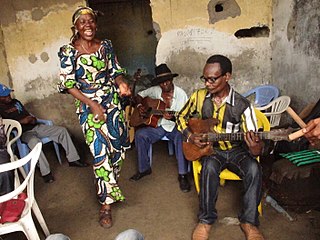
Congolese rumba, also known as African rumba, is a dance music genre originating from the Republic of the Congo and Democratic Republic of the Congo. With its rhythms, melodies, and lyrics, Congolese rumba has gained global recognition and remains an integral part of African music heritage. In December 2021, it was added to the UNESCO list of intangible cultural heritage.
Lawndale High School is one of three high schools in Lawndale, California, United States. The school was closed in 1981, and reopened in 1998. It is one of three schools in the Centinela Valley Union High School District.
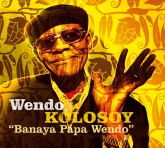
Antoine Wendo Kolosoy, known as Papa Wendo, was a Congolese musician. He is considered the "doyen" of Congolese rumba, a musical style blending traditional Kongolese rhythm and son cubano.
Jesús Alejandro Pérez is a Cuban-Canadian multi-instrumentalist and bandleader based in Montreal and Los Angeles. He is a member of Ricardo Lemvo's Makina Loca, a salsa band that combines Cuban and Angolan music styles.
Antilliaanse Feesten is a Caribbean music festival that takes place in every second weekend of August in Hoogstraten, Belgium. It had 38,000 attendees in 2016. The festival was first held in 1983, and has been repeated every year except 2000.
Bopol Mansiamina, also known as Bopol or Don Paolo, was a prolific and renowned Congolese musician. He recorded and performed extensively over four decades as a solo artist, as a member of leading African bands, and in support of many African musicians. Bopol was best known for his work in the 1980s and early 1990s as one of the four members of the Paris-based supergroup Les Quatre Etoiles and as a solo artist.
Syran Mbenza is a guitarist, originally from the Democratic Republic of the Congo, who has lived in Paris since about 1981. He has recorded and performed prolifically over five decades, including as a solo artist; as one of the four members of the popular soukous "supergroup" Les Quatre Étoiles; as a founding member of the acoustic, Congolese rumba revival band Kékélé; in other bands; and in support of numerous artists. He has been described as one of the greatest guitar players of Africa.

Galo Negro is an album by the Angolan Congolese musician Sam Mangwana, released in 1998. Mangwana deemed his sound "Congolese Rumba." Mangwana supported the album with a North American tour, accompanied by labelmate Ricardo Lemvo.
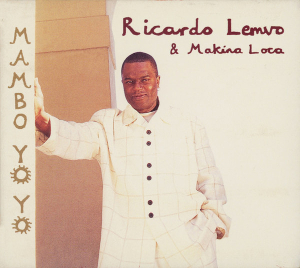
Mambo Yo Yo is an album by the Congolese musician Ricardo Lemvo, released in 1998. He is credited with his band, Makina Loca. Lemvo supported the album with a North American tour that included shows as part of his label's AfroLatino Nights tour.











